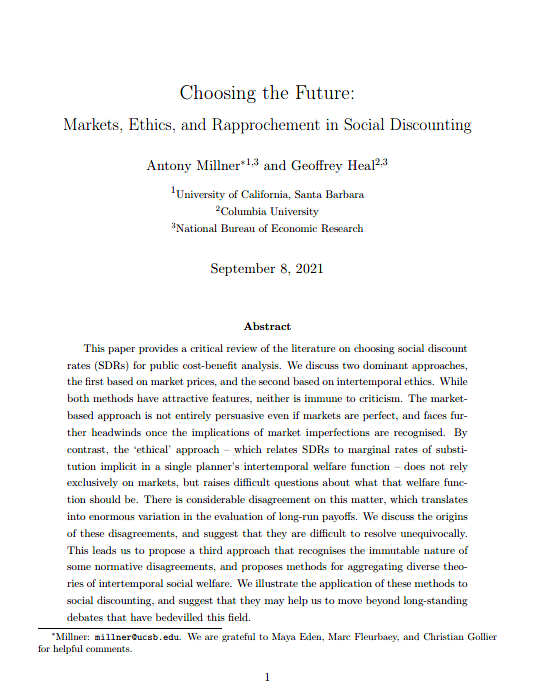Choosing the future: Markets, ethics and rapprochement in social discounting
Antony Millner (University of California, Santa Barbara and National Bureau of Economic Research) and Geoffrey Heal (Columbia University and National Bureau of Economic Research)
GPI Working Paper No. 13-2021, published in Journal of Economics Literature
This paper provides a critical review of the literature on choosing social discount rates (SDRs) for public cost-benefit analysis. We discuss two dominant approaches, the first based on market prices, and the second based on intertemporal ethics. While both methods have attractive features, neither is immune to criticism. The market-based approach is not entirely persuasive even if markets are perfect, and faces further headwinds once the implications of market imperfections are recognised. By contrast, the ‘ethical’ approach – which relates SDRs to marginal rates of substitution implicit in a single planner’s intertemporal welfare function – does not rely exclusively on markets, but raises difficult questions about what that welfare function should be. There is considerable disagreement on this matter, which translates into enormous variation in the evaluation of long-run payoffs. We discuss the origins of these disagreements, and suggest that they are difficult to resolve unequivocally. This leads us to propose a third approach that recognises the immutable nature of some normative disagreements, and proposes methods for aggregating diverse theories of intertemporal social welfare. We illustrate the application of these methods to social discounting, and suggest that they may help us to move beyond long-standing debates that have bedevilled this field.
Other working papers
Prediction: The long and the short of it – Antony Millner (University of California, Santa Barbara) and Daniel Heyen (ETH Zurich)
Commentators often lament forecasters’ inability to provide precise predictions of the long-run behaviour of complex economic and physical systems. Yet their concerns often conflate the presence of substantial long-run uncertainty with the need for long-run predictability; short-run predictions can partially substitute for long-run predictions if decision-makers can adjust their activities over time. …
Misjudgment Exacerbates Collective Action Problems – Joshua Lewis (New York University) et al.
In collective action problems, suboptimal collective outcomes arise from each individual optimizing their own wellbeing. Past work assumes individuals do this because they care more about themselves than others. Yet, other factors could also contribute. We examine the role of empirical beliefs. Our results suggest people underestimate individual impact on collective problems. When collective action seems worthwhile, individual action often does not, even if the expected ratio of costs to benefits is the same. …
On two arguments for Fanaticism – Jeffrey Sanford Russell (University of Southern California)
Should we make significant sacrifices to ever-so-slightly lower the chance of extremely bad outcomes, or to ever-so-slightly raise the chance of extremely good outcomes? Fanaticism says yes: for every bad outcome, there is a tiny chance of of extreme disaster that is even worse, and for every good outcome, there is a tiny chance of an enormous good that is even better.
- « Previous
- 1
- …
- 35
- 36
- 37

